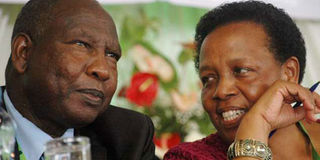Former TSC boss sets his sights on governor position

TSC chief executive officer Gabriel Lengoiboni with TSC commissioner Salome Gichura during a secondary school heads meeting at Wildwaters on June 26, 2014. Mr Lengoiboni has said he will vie for Samburu governorship. PHOTO | LABAN WALLOGA | NATION MEDIA GROUP
What you need to know:
- Mr Peter Lengees, who served as Samburu West MP from 1988 to 2002, says the power of Samburu society lies with the elders.
- Governor Lenolkulal believes that Samburu elders will still bless him in 2017 because of his achievements in education, infrastructure and creating jobs for the youth.
The race for the Samburu governor seat has heated up after former Teachers Service Commission boss Gabriel Lengoiboni announced he will vie for the position.
Mr Lengoiboni, who has worked in the public service for the last 30 years, will lock horns with the incumbent, Mr Moses Lenolkulal.
Former Samburu West MP Simeon Lesirma is said to be also eyeing the seat, but he is yet to make his announcement official.
Over the years, Samburu politics has been less about campaigns since it is the elders who always have a say on the county’s elective posts.
Samburu, a Maa speaking nomadic tribe, is divided into eight clans and Ilmasula, the largest, has for many years dominated politics in the region, until recently.
Mr Peter Lengees, who served as Samburu West MP from 1988 to 2002, says the power of Samburu society lies with the elders.
“When I first set my foot in Parliament in 1988, I never campaigned because the elders endorsed me. They arrive at this decision after holding a series of meetings under a tree,” said the politician.
Other clans are the Ilpsikishu, Lorokushu, Long'eli, Loimisi, Ilukumae, Ilng’wesi and Ilnyaparae whose political strength can roughly be rated in that order.
During election years, the elders also try to divide other elective posts amongst the smaller clans.
After serving for three terms, Mr Lengees lost his parliamentary seat to Mr Simeon Lesirma, who was equally endorsed by the elders. Mr Lesirma is from Ilpisikishu clan.
He vied for the senatorial position in 2013 elections but lost to Mr Sammy Leshore, from Long’eli clan.
A few days before the 2013 elections, Samburu elders from different villages and clans held meetings to decide who was going to be elected as the governor, senator, and MP, among others.
The elders thought that the best candidate to be governor was Mr Lengoiboni, who, however, disappointed them as he failed to resign as the Teachers Service Commission boss.
I AM STILL ELIGIBLE
Mr Moses Lenolkulal was later blessed to vie for the post. In their regular meetings called Nkiguana, a sort of Samburu parliament and court, elders hold debates regarding political leadership and every election year they assess those they endorsed to see if they can fit to continue or not.
Mr Sylvester Letoluai, a long-serving teacher in Samburu, feels that lack of education is another determining factor.
“Those voters who cannot read or write have for many years been influenced by politicians or the officers at polling stations.”
Governor Lenolkulal believes that Samburu elders will still bless him in 2017 because of his achievements in education, infrastructure and creating jobs for the youth.
“When I was elected I had plans in place to improve Samburu County’s economy. The elders blessed me and I made a promise to them, which I fulfilled. It’s now four years and we have achieved a lot.”
He said he has built early childhood development centres across the county and that thousands of children living in remote villages now have access to education.
“My government has also ensured that for the first time, Maralal town roads are tarmacked.”
His supporters agree. “Our governor has done well. For the first time we have street lights all over Maralal town, this has improved security here. The Maralal Referral Hospital has improved unlike before: we now have ambulances and more health professionals,” said Mr Bosco Lekaasu, a resident of Kulapesa village near Maralal town.
Critics, including Mr Lengoiboni, however, note there is rampant misuse of public funds.
But those against Mr Lengoiboni say that he headed the Teachers Service Commission when it was classified as the second most corrupt institution in the country.





